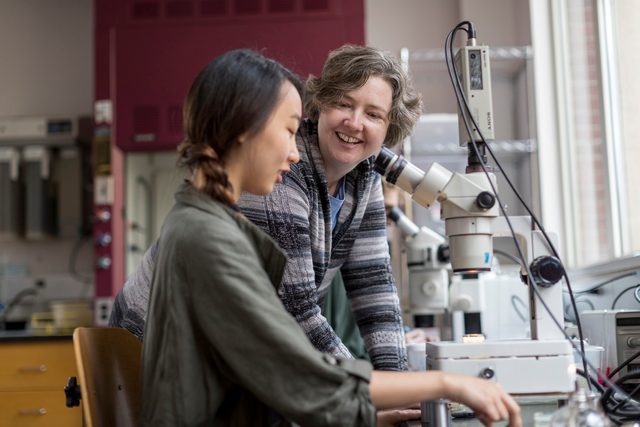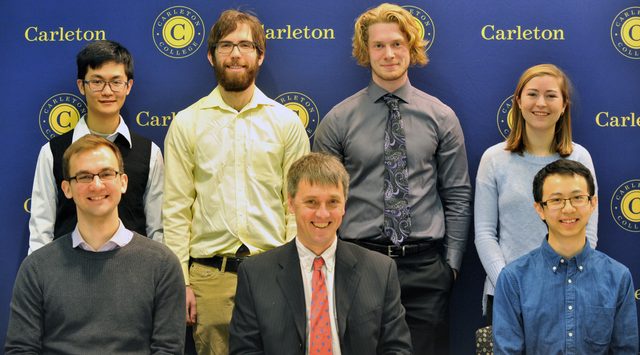 On the first day of fall term, Professor Jennifer Wolff stood in front of her Introduction to Biology class and showed an innocuous slide of her research with microscopic worms. “You won’t know what all of this means yet,” she told them, “but it’s the kind of work I specialize in.” She studies a worm known as C. elegans for neuron changes that could be extended to behavioral functions in complex mammals, so she—quite reasonably—assumed her work was a bit beyond her beginning students.
On the first day of fall term, Professor Jennifer Wolff stood in front of her Introduction to Biology class and showed an innocuous slide of her research with microscopic worms. “You won’t know what all of this means yet,” she told them, “but it’s the kind of work I specialize in.” She studies a worm known as C. elegans for neuron changes that could be extended to behavioral functions in complex mammals, so she—quite reasonably—assumed her work was a bit beyond her beginning students.
But immediately after class, a sophomore approached Wolff. “She said, ‘Do you do that with worms in your lab here? Right now?’ And I said, ‘Yes, of course.’ Her eyes lit up. ‘Wait, when are you doing it next? And can I stop by and see it?’
“I shouldn’t be surprised by Carleton students, but for the first day, that was a new one,” Wolff says, chuckling.
While student-faculty research starts with recruiting enthusiastic undergrads, eventually Carls are expected to contribute—and in most cases, own their research—like scientific peers. It’s all part of Carleton’s strong foundation for authentic lab experiences, a philosophy that pairs day-to-day discipline with meaningful mentorship and research so that students are prepared for intensive work at graduate institutions.
Carleton alumni earned 3,229 PhDs between 1966 and 2014, ranking second among all baccalaureate colleges, according to the National Science Foundation’s Survey of Earned Doctorates. Particularly prolific fields include chemistry, earth sciences, and astronomy (in which Carleton ranks first); biological sciences and physics (ranks second); and agricultural sciences (ranks fourth).
“We need to be able to show students that we are active researchers here. They need to envision themselves as scientists early on,” says Wolff. “Whether they are going to graduate school or medical school, will be teaching science or writing about it, people are looking for students who’ve had authentic research experience. They have to understand the process of discovering new knowledge.”
 Nathaniel Strauss ’16 (Holmen, Wis.) learned how big those discoveries could be when he sat on a press conference dais in February with physics professor Nelson Christensen to answer questions about gravitational waves. Strauss was one of two Carleton students listed as an author on the historic discovery paper published by the 1,000-plus member Laser Interferometer Gravitational-wave Observatory (LIGO) team. LIGO, comprising some of the best scientific minds in the world, made international headlines last year when it detected a gravitational wave generated by the collision of two black holes—confirming Einstein’s theory of general relativity.
Nathaniel Strauss ’16 (Holmen, Wis.) learned how big those discoveries could be when he sat on a press conference dais in February with physics professor Nelson Christensen to answer questions about gravitational waves. Strauss was one of two Carleton students listed as an author on the historic discovery paper published by the 1,000-plus member Laser Interferometer Gravitational-wave Observatory (LIGO) team. LIGO, comprising some of the best scientific minds in the world, made international headlines last year when it detected a gravitational wave generated by the collision of two black holes—confirming Einstein’s theory of general relativity.
“It was such a wonderful opportunity to have that kind of experience so early in my physics career,” says Strauss, now a first-year graduate student at the University of Florida. “At the same time, it was very, very overwhelming. You’re basically thrown in with experts and professionals who know so much more than you, yet you’re expected to give them updates and present to them. But you eventually learn that they’re very receptive to undergraduates trying to learn the ropes.”
Christensen often uses his Atomic and Nuclear Physics class as a barometer for whether a student will make a strong research assistant. The key for success, he says, is a work ethic steeped in the reality that “once you finish a project, you’ll immediately start on something more difficult.”
He isn’t joking. As 30-plus years of personal investment in gravitational waves proved, the payoff is rarely instantaneous. “But you keep at it and see the growth,” Christensen says. “That’s especially true with undergrads. They make so much progress when you work with them over several years. I can’t tell you the number of times someone in the LIGO collaboration said to me, ‘Hey that graduate student of yours is really productive.’ And I’d have to say to them, ‘Yeah, that’s not a graduate student. That’s an undergrad.’ ”
It’s a level of assurance that doesn’t come by accident, says chemistry professor Chris Calderone. He recently received a National Science Foundation grant for his lab work with the enzymes that create complex molecules. The most famous example of a natural product—penicillin, which is derived from mold growth—serves as a starting point for beginning scientists to uncover other valuable links for therapeutics.
“As a community of scientists, we believe in giving students the kind of research they can really sink their teeth into,” Calderone says. “Even a sophomore with a basic understanding of organic chemistry knows what penicillin is, so we talk about getting more anti-cancer drugs and anti-cholesterol drugs in hand, all with the aim of improving the human condition. These could be incredibly substantive discoveries that all start by making fundamental connections in a lab at Carleton.”
